Your search “Keep%20ethe%20eDeath%20ePenalty%abolished%20ein%20ethe%20ePhilippfines%20e%20e%20e%20e%20e%20e%20e%20e%20e%20e%20e%20e/page/q26%20eindividuals%20ethat%20eOhio%20eintends%20eto%20eexecute%20eeach%20esuffer%20efrom%20esome%20ecombination%20eof%20esevere%20emental%20eillness,%20eintellectual%20edisability,%20eserious%20echildhood%20etrauma%20efrom%20ephysical%20eand%20esexual%20eabuse,%20eor%20ewere%20eyoung%20eadults%20ewith%20eimpaired%20ejudgment%20ewhen%20ethey%20ecommitted%20etheir%20ecrimes. ”
Article(s)
UN Protocol on death penalty turns 20
on 15 December 2009
For 20 years, the United Nations Protocol to abolish the death penalty has been the only universal treaty of worldwide scope to prohibit executions and secure universal abolition of the death penalty for all crimes.
2009
Armenia
Burundi
Côte d'Ivoire
Dominican Republic
El Salvador
Kazakhstan
Kyrgyzstan
Latvia
Mauritius
Poland

Article(s)
Advocating for the Adoption of the Draft Protocol by the African Union: A Step in the Right Direction for Abolition in Africa
By Florence Venunye Ayivor-Vieira and Hervé Nsambimana, on 15 December 2023
Advocacy in Addis-Ababa On the 10 October 2023, the FIACAT (International Federation of ACATs), and the World Coalition Against the Death Penalty, represented by Ms. Florence Ayivor-Vieira of ACAT-Ghana and Mr. Hervé Nsabimana of CODHAS (Centre d’observation des Droits de l’Homme et d’Assistance Sociale), Co-Chairpersons of the World Coalition’s working group on the draft protocol […]
2023
Trend Towards Abolition
Document(s)
Facts and Figures 2007
By World Coaliton against the death penalty , on 10 October 2009
2009
Campaigning
Trend Towards Abolition
frMore details Download [ pdf - 24 Ko ]
Facts and Figures 2007
- Document type Campaigning
- Themes list Trend Towards Abolition
- Available languages Faits et chiffres 2007
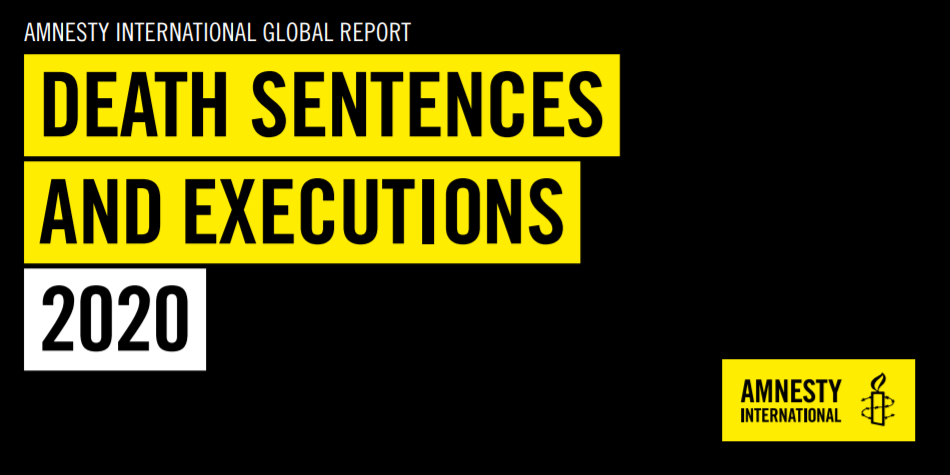
Article(s)
Editorial: Amnesty International releases annual report
By Amnesty International, on 27 May 2021
On 21 April, we published our annual report on the global use of the death penalty, which shows that in 2020 the world got one step closer to freeing itself from this cruel punishment.
2021
Cruel, Inhuman and Degrading Treatment and Punishment
Death Row Conditions
Public Opinion
Document(s)
Facts and Figures 2008
By World Coalition against the death penalty , on 10 October 2008
2008
Campaigning
Trend Towards Abolition
frMore details See the document
Facts and Figures 2008
- Document type Campaigning
- Themes list Trend Towards Abolition
- Available languages Faits et chiffres 2008

Article(s)
Statement on the occasion of the adoption of the upr report of Mauritania
By Together against the death penalty, the Mauritanian Association for Human Rights, The Advocates for Human Rights and the World Coalition Against the Death Penalty, on 2 August 2021
Together against the death penalty, the Mauritanian Association for Human Rights, The Advocates for Human Rights and the World Coalition Against the Death Penalty welcome the adoption of the report of the Working Group on the Universal Periodic Review of Mauritania by the Human Rights Council.
2021
Mauritania
Moratorium
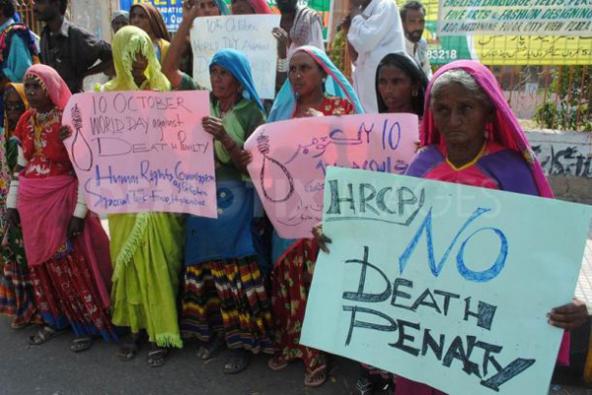
Article(s)
2007 Campaign : developing the world abolitionist movement
on 1 May 2007
The World Coalition Against the Death Penalty has obtained financial support from the European Commission for its 2007 campaign, an indication of its growing recognition and legitimacy.
2007
Article(s)
Flurry of initiatives against the death penalty at ACATs in the past year
on 7 August 2007
During the past year, the 28 member associations in the FIACAT network have given their abolitionist activities a boost. The issue of the death penalty is at the heart of their mission.
2007
Belgium
Burundi
Canada
Democratic Republic of the Congo
France
Luxembourg
Switzerland
United Kingdom

Article(s)
Applause for Pennsylvania’s death penalty moratorium
By Death Penalty Focus, "Free Mumia!" French Support Group, on 23 February 2015
Newly elected Governor Tom Wolf placed a moratorium on executions in Pennsylvania on 13 February until concerns about the fairness of the state’s death penalty system are addressed.
2015
Moratorium
United States
Article(s)
Death sentences in Morocco
on 9 May 2007
The World Coalition against the death penalty, the FIDH and the Moroccan Coalition against the Death Penalty are concerned with the continued pronunciation of death sentences by Moroccan courts
2007
Morocco
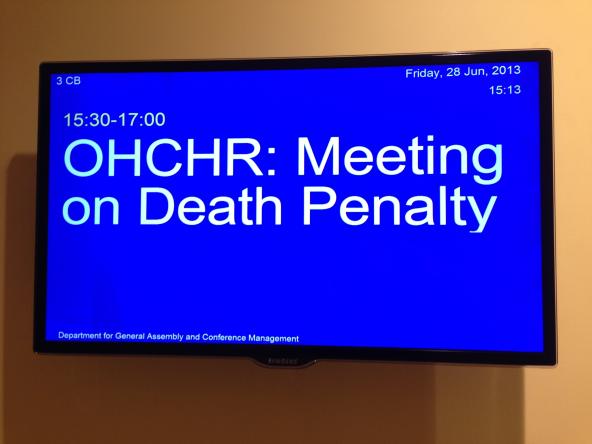
Article(s)
United Nations panel hears from innocent sentenced to death
By Maria Donatelli, on 4 July 2013
World Coalition members and a man who spent 18 years on death row for murders he did not commit joined UN Secretary General Ban Ki-Moon for a debate on capital punishment.
2013
Innocence
United States
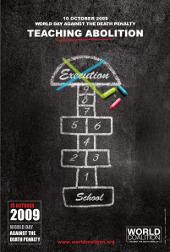
Article(s)
7th World Day Against the Death Penalty: teaching abolition
By Aurélie Plaçais, on 27 July 2009
On 10 October 2009, World Day Against the Death Penalty, the World Coalition Against the Death Penalty wishes to teach abolition to all citizens around the world, especially to teenagers aged 14 to 18.
2009
Public Opinion
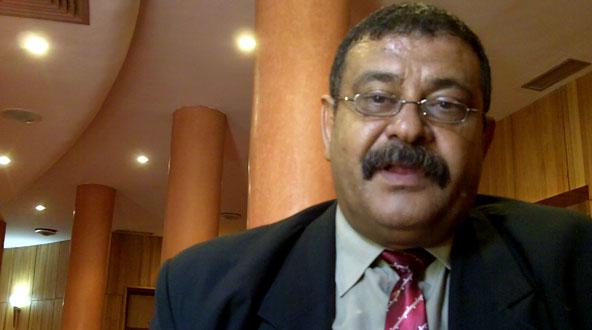
Article(s)
More than 1,000 sentenced to death in Iraq in 8 years
By Dr Nasr Abbood, on 1 March 2012
The Iraqi institutions established after the US-led invasion and the fall of Saddam Hussein have reinstated the death penalty and extended its scope since 2004. In this op-ed article, Iraqi Coalition Against the Death Penalty president Nassr Abood calls for alternative sentences and for a strong stance from the international community.
2012
Drug Offenses
Iraq
Iraq
Terrorism
Article(s)
Africa’s human rights body takes a stance against the death penalty
on 30 November 2008
The African Commission on Human and Peoples’ Rights calls for a moratorium on executions and the ratification of the UN Protocol for the abolition of the death penalty.
2008
Fair Trial
Document(s)
Facts and Figures 2013
on 10 October 2013
2013
Campaigning
Trend Towards Abolition
aresMore details Download [ pdf - 115 Ko ]
Facts and Figures world day against the death penalty 2013
- Document type Campaigning
- Themes list Trend Towards Abolition
- Available languages Faits et chiffres 2013PENA DE MUERTE HECHOS Y DATOS
Article(s)
ICC paves the way for justice without killing
on 18 July 2009
The University of Kinshasa has hosted a conference on the theme of death penalty-free justice to celebrate the 11th anniversary of the Rome Statute, which established the International Criminal Court.
2009
Democratic Republic of the Congo

Article(s)
Statement on the occasion of the adoption of the upr report of Lebanon
By Ensemble contre la peine de mort (ECPM), on 2 August 2021
We welcome Lebanon’s position in accepting some of the recommendations on strengthening the justice sector and improving strengthening the justice sector and those aimed at improving the conditions of detention, including the fight against acts of torture and ill-treatment.
2021
Lebanon
Moratorium
Article(s)
Liberia illegally restores the death penalty
on 28 July 2008
New Liberian legislation makes some violent crimes punishable by death, in violation of the country’s international obligations.
2008
Liberia
Liberia
Terrorism
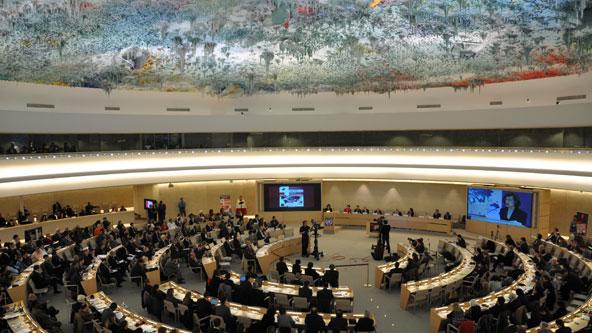
Article(s)
Discussion at the Human Rights Council of human rights violations related to the use of the death penalty
By Jessica Corredor, on 7 March 2017
From Zeid Ra’ad Al Hussein, United Nations High Commissioner for Human Rights, to abolitionist and retentionist government representatives and World Coalition members, participants to the Biennial high-level discussion on death penalty exchanged views in order to address human rights violations related to the use of the death penalty, in particular with respect to the prohibition of torture.
2017
Cruel, Inhuman and Degrading Treatment and Punishment

Article(s)
Progress and impediments on path to abolition in U.S.
By Russ Feingold & Christopher Wright Durocher, on 3 April 2024
When President Biden won the 2020 election, he became the first successful U.S. presidential candidate to publicly oppose the death penalty.
2024
United States
Jobs
SOUTH ASIA AND THE MIDDLE EAST (SAME)
on 19 September 2024
Available grants are indicated below, with the specific target countries and the specific maximum amounts for each Worldwide Grant Grant SAME 1 All South Asia and Middle East countries Grant SAME 2 Target country: Jordan How to apply? Worldwide Grant 8 grants of maximum 1,000 EUR each on data collection gathering on intersectional discrimination faced […]
2024
Jobs
ASIA PACIFIC
on 19 September 2024
Available grants are indicated below, with the specific target countries and the specific maximum amounts for each Worldwide Grant Grant Asia 1 All Asia Pacific countries Grant Asia 2 All Asia Pacific countries Grant Asia 3 All Asia Pacific countries Grant Asia 4 Bangladesh Grant Asia 5 Fiji, Papua New Guinea, Samoa Grant Asia 6 […]
Jobs
AFRICA
on 19 September 2024
Available grants are indicated below, with the specific target countries and the specific maximum amounts for each Worldwide Grant Grant Africa 1 Burkina Faso, Burundi, Central African Republic, Congo, Ghana, Sierra Leone, Zambia Grant Africa 2 Cameroon and DRC Grant Africa 3 Kenya Grant Africa 4 Kenya Grant Africa 5 Target countries: Kenya, Nigeria, Uganda […]
Jobs
USA AND THE GREATER CARIBBEAN (UGC)
on 19 September 2024
Available grants are indicated below, with the specific target countries and the specific maximum amounts for each Worldwide Grant Grant UGC 1 Suriname Grant UGC 2 USA How to apply? Worldwide Grant 8 grants of maximum 1,000 EUR each on data collection gathering on intersectional discrimination faced by women and/or LGBTQIA+ people sentenced to death. […]
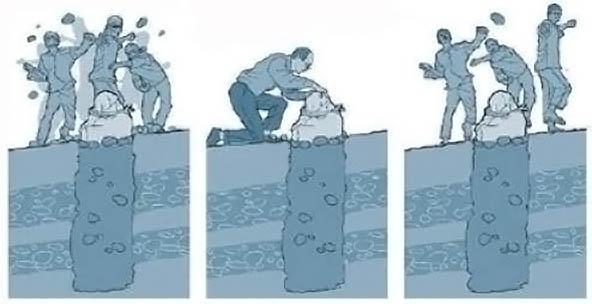
Article(s)
World Coalition members share knowledge on UN advocacy
By Asil Abuassba (The Advocates for Human Rights), on 19 February 2015
Asil Abuassba, a Palestinian intern with World Coalition member organisation The Advocates for Human Rights, attended a training session to help global activists submit reports on the death penalty situation in their countries to UN bodies.
2015
Cruel, Inhuman and Degrading Treatment and Punishment
Death Row Conditions
Fair Trial
Innocence
Intellectual Disability
Juveniles
Mental Illness
Article(s)
Web-Editor
By World Coalition Against the Death Penalty, on 9 October 2018
The World Coalition Against the Death Penalty is recruiting a Web-editor/Editorial Webmaster for its website.
2018
Article(s)
Web-Editor
By World Coalition Against the Death Penalty, on 17 October 2016
The World Coalition Against the Death Penalty is recruiting a Web-editor for its website.
2016
Article(s)
A World Without the Death Penalty – IX Congress of the Ministers of Justice
By Federica Merenda, on 29 February 2016
On 22 February 2016, the representatives of more than twenty countries gathered in Rome for the 9th International Congress of the Ministers of Justice « A World without the death penalty », organized by the Community of Sant’Egidio and hosted by the Italian Chamber of Deputies. Burundi, Cambodia, Central African Republic, Congo, El Salvador, Guinea Conakry, Cȏte d’Ivoire, Mali, Mongolia, Rwanda, Somalia, Sri Lanka, South Africa, Timor-Leste, Togo, Uganda, Viet Nam, Zimbabwe are the countries who joined Italy in the last edition of this annual conference.
2016
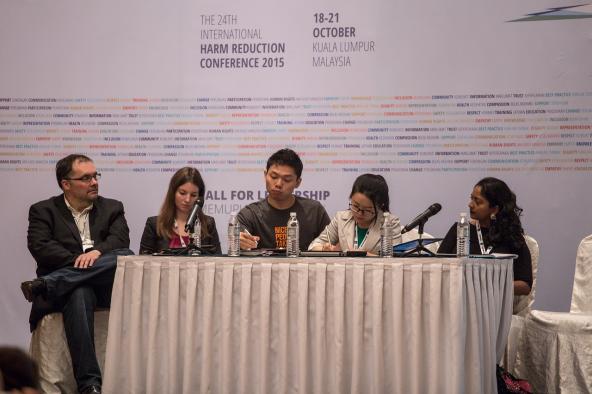
Article(s)
The death penalty for drugs must go, it has no place in a civilised society
By Aurélie Plaçais, on 21 October 2015
Those were the words of Anand Grover, former UN Special Rapporteur on the right to health during the opening ceremony of Harm Reduction International’s 24th conference in Kuala Lumpur, Malaysia.
2015
China
Drug Offenses
India
Indonesia
Malaysia
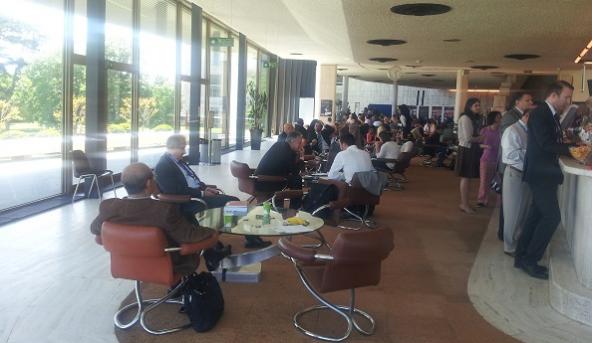
Article(s)
Abolitionist NGOs lobby to educate UN member states in Geneva
By Aurélie Plaçais, on 22 April 2015
Several World Coalition members carried out intense advocacy activities during and after the March session of the Human Rights Council to prepare for the coming UPR session, during which Liberia, Malawi and the USA will be examined.
2015
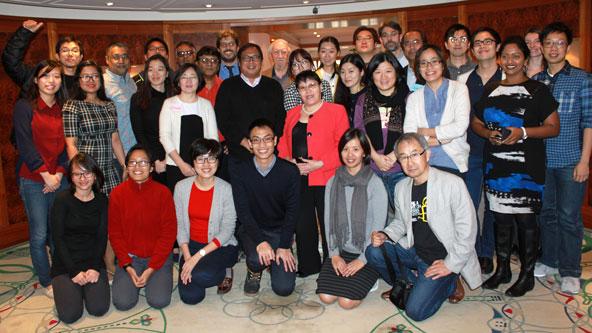
Article(s)
ADPAN network strengthens abolitionists across Asia
By Aurélie Plaçais (in Taipei, Taiwan), on 9 December 2014
The Anti-Death Penalty Asia Network, a coalition hosted by Amnesty International in London since 2006, has become an independent organisation registered in Malaysia and held its first AGM in Taipei, Taiwan on 4-5 December.
2014
China
Japan
Malaysia
Mongolia
Public Opinion
Republic of Korea
Taiwan
Taiwan
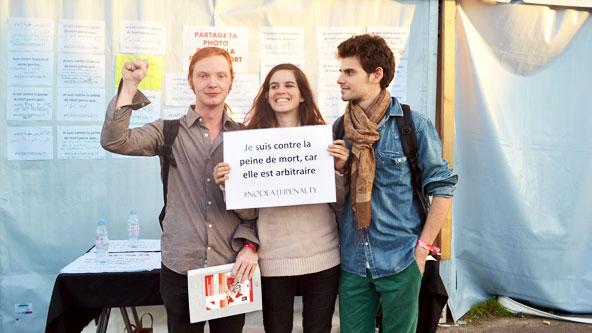
Article(s)
ECPM takes social media campaign to the fair ground
By Bronwyn Dudley, on 16 September 2014
World Coalition member organisation Ensemble contre la peine de mort (ECPM) was at September’s Fête de l’Humanité in Paris to spread awareness of the 12th World Day Against the Death Penalty on October 10.
2014
France
Intellectual Disability
Mental Illness

Article(s)
Belarus ends more than one year without execution
By Daria Gribanova, on 14 April 2014
Despite an execution this month, Amnesty International’s latest annual report on the death penalty shows Belarus did not kill any prisoner last year, meaning Europe and Central Asia was execution-free for the first time since 2009. This achievement bolsters local abolitionists – despite the risks they face in their activism.
2014
Belarus
Belarus
Moratorium
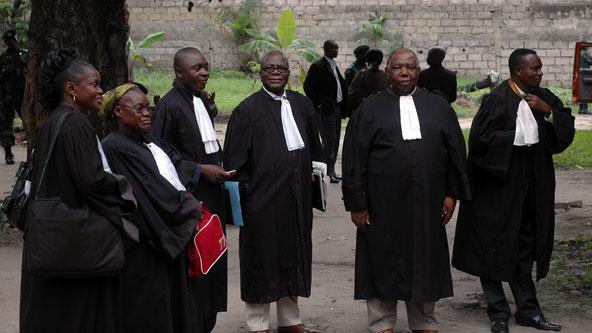
Article(s)
New defense manual to help lawyers in capital cases worldwide
By Thomas Hubert, on 29 May 2013
The World Coalition, together with Death Penalty Worldwide and the law firm of Fredrikson & Byron P.A., has launched the English and French editions of a manual compiling guidelines for defense lawyers whose clients face the death penalty at the 5th World Congress Against the Death Penalty.
2013
Legal Representation
Article(s)
Translations in Chinese
By World Coalition Against the Death Penalty, on 21 January 2013
The World Coalition Against the Death Penalty’s office in Paris, France, is currently calling for translation contributions in Chinese.
The objective is to award contracts for translation services for the publications of the World Coalition Against the Death Penalty for 30 months (mid 2013 – mid 2015).
2013

Article(s)
‘Sakineh’ campaign to culminate in worldwide protests
on 25 August 2010
What started as an effort to save an Iranian woman sentenced to death by stoning is turning into a global movement for human rights and against capital punishment.
2010
Cruel, Inhuman and Degrading Treatment and Punishment
Iran (Islamic Republic of)
Public Opinion
Article(s)
World Coalition takes part in UN death penalty report launch
on 30 May 2010
The World Coalition held a side event to accompany the presentation of the 8th Quinquennial Report of the UN Secretary General on capital punishment in Vienna on May 19.
2010
Death Row Conditions
Innocence
Juveniles
Legal Representation
Article(s)
Hank Skinner’s execution stayed amid international action
on 25 March 2010
The American death row inmate heard the news less than one hour before he was scheduled to die. From Huntsville to Paris, activists demand that new evidence be examined.
2010
Innocence
United States
Article(s)
Activists from Burundi, Rwanda and DR Congo join forces
on 3 December 2008
The Great Lakes Regional Coalition Against the Death Penalty held its first meeting on November 17 in Kinshasa. Its lobbying efforts have accelerated Burundi’s legislative process.
2008
Burundi
Democratic Republic of the Congo
Moratorium
Rwanda
Page(s)
Become a member
on 22 June 2020
Only legal entities can join the World Coalition Against the Death Penalty In accordance with article 5.1. of its Bylaws, the World Coalition welcomes organizations that share the aim of the universal abolition of the death penalty. What the World Coalition offers its members What the World Coalition does not offer its members How members […]
2020
Page(s)
Life of the Network
on 22 June 2020
Abolitionists around the world are mobilizing to end the death penalty. World Day, World Congress, important events for the life of the World Coalition such as the steering committees, but also meetings, events and actions carried out by our members around the world: do not miss any event related to the fight against the death […]
Article(s)
Flurry of educational events on World Day Against the Death Penalty
on 6 November 2009
An abolitionist wave of marches, cultural happenings, petition signings and educational events swept across the world for the 7th World Day on October 10.
2009
Australia
Clemency
Democratic Republic of the Congo
India
Indonesia
Innocence
Public Opinion
Taiwan
United States

Article(s)
Closing ceremony of the project « My pencil for abolition » at the French Ministry of foreign affairs
By Marion Gauer, on 27 May 2016
On May 23rd, 2016, the closing ceremony of the project “My pencil for abolition” took place at the French Ministry of Foreign Affairs. This project was organized by the team of “Educating and Raising Awareness on Abolition” in the association Together Against the Death Penalty (ECPM): it consisted in involving a few middle and high school’s classes, from Lorraine, Belfort and the Parisian region, in the elaboration of articles and cartoons in order to create a magazine committed to the abolition of the death penalty, known as the Abolition Mag.
2016
Public Opinion

Member(s)
Comitato Paul Rougeau
on 30 April 2020
Paul Rougeau was sentenced to death in Texas for the murder of an off-duty policeman. He always maintained he was innocent. In 1992, after he had spent 15 years on death row, the Italian newspaper Il Manifesto printed a letter by Paul Rougeau on its front page. A group of Italian citizens then decided to […]
2020
Italy

Member(s)
The Advocates for Human Rights
on 30 April 2020
The mission of The Advocates for Human Rights is to implement international human rights standards in order to promote civil society and reinforce the rule of law. By involving volunteers in research, education, and advocacy, The Advocates build broad constituencies in the United States and select global communities. In 1991, The Advocates adopted a formal […]
United States
Document(s)
Defending Women and Transgender Persons Facing Extreme Sentences: A Practical Guide
on 14 January 2022
2022
Legal Representation
Legal Representation
Women
frMore details See the document
Written by a team including experts in the fields of capital defense, gender rights, gender-sensitive mitigation and the rights of transgender persons, the guide includes sections on gender-based violence, women’s mental health, prison conditions, discrimination in the legal system, working with the media, and how to build a gender-sensitive team. It also includes a step-by-step gender-sensitive interview protocol that builds on resources developed by the anti-violence community and is tailored to the needs of defense teams.
- Document type Legal Representation
- Themes list Legal Representation / Women
- Available languages Défendre les femmes et les personnes transgenres confrontées à des peines extrêmes
Document(s)
Death by Design: Part 2
By The Wren Collective, on 23 January 2024
2024
NGO report
Legal Representation
United States
More details See the document
Published in December 2023.
In “Death by Design” Parts 1 and 2, Wren investigated the state of court-appointed capital representation in Harris County—the death penalty capital of the world. The second report examines why that poor representation has thrived, and the ways that the judges overseeing those cases have enabled it to continue that way.
Wren recommends a total overhaul to the system of capital representation for poor defendants in Harris County, with either the public defender absorbing those cases or the judges establishing a new, freestanding capital public defender that is independent from judicial oversight.
- Document type NGO report
- Countries list United States
- Themes list Legal Representation
Document(s)
Prison Conditions in Jamaica
on 19 April 2011
2011
NGO report
Death Row Conditions
Jamaica
More details Download [ pdf - 396 Ko ]
In criminal justice matters, Jamaica has been rightly praised for its de-facto abolitionist
stance on the death penalty: nobody has been executed on the island since 1988.
However, the alternative to death is imprisonment. For many years, NGOs, the UN
Human Rights Committee, the Inter-American Commission on Human Rights, and
various independent and internal reports have expressed serious concern about the
conditions in which Jamaica detains its prisoners.
- Document type NGO report
- Countries list Jamaica
- Themes list Death Row Conditions
Document(s)
Educational guide: teaching abolition
By World Coalition against the death penalty , on 10 October 2011
2011
Campaigning
Trend Towards Abolition
frMore details See the document
In 2009, the World Day Against the Death Penalty was
dedicated to the theme “Teaching Abolition”. The World
Coalition developed a teaching guide to be used in
schools throughout the world
- Document type Campaigning
- Themes list Trend Towards Abolition
- Available languages Guide pédagogique: éduquer à l'abolition
Document(s)
Leaflet – World Day 2023
on 12 June 2023
2023
Campaigning
World Coalition
arfrMore details Download [ pdf - 1095 Ko ]
Leaflet for the 21th World Day against the death penalty (2023), on torture and the death penalty.
- Document type Campaigning / World Coalition
- Available languages كتيب - اليوم العالمي 2023Brochure - Journée mondiale 2023
Document(s)
Investigating Attitudes to the Death Penalty in Indonesia Part One – Opinion Formers: An Appetite for Change
By Carolyn Hoyle - The Death Penalty Project, in partnership with LBH Masyarakat and the University of Indonesia, on 28 June 2021
2021
NGO report
Drug Offenses
Indonesia
Public Opinion
More details See the document
In 2019-20, The Death Penalty Project, in partnership with LBH Masyarakat and the University of Indonesia, commissioned Professor Carolyn Hoyle, of The Death Penalty Research Unit at the University of Oxford to conduct research investigating attitudes towards the death penalty in Indonesia.
The findings have been presented in a two-part report; the first details the findings of a nuanced public survey and the second details the findings of interviews conducted with opinion formers.
- Document type NGO report
- Countries list Indonesia
- Themes list Drug Offenses / Public Opinion
Document(s)
Explaining the Invidious: How Race Influences Capital Punishment in America
By Sheri Lynn Johnson, James and Mark Flanagan, Cornell Law School, on 1 September 2022
2022
Academic report
United States
More details See the document
This article primarily focuses on how racial bias creates nearly ubiquitous racial disparities in the imposition of the death penalty; it does so both to amass further reasons McCleskey was wrongly decided, and to point the way forward. Part I provides the necessary foundation by summarizing the history of race and the death penalty in the United States, with a focus on the Supreme Court’s treatment of racial discrimination claims in capital sentencing. Part II, the heart of this Article, examines the multiple psychological mechanisms that create racially biased decision making in capital cases. Understanding those mechanisms further undercuts the Supreme Court’s reasoning in McCleskey and argues for overturning the holding. However, recognizing the reluctance with which today’s Court would view overturning McCleskey, Part III considers whether and how alternative, case-specific uses of the data described in Part II might ameliorate the influence of racial bias in capital sentencing.
- Document type Academic report
- Countries list United States
Document(s)
Lebanon – Committee on the Elimination of Discrimination Against Women – Death Penalty
on 12 January 2022
2022
NGO report
World Coalition
Lebanon
Women
More details Download [ pdf - 1599 Ko ]
This report addresses Lebanon’s compliance with human rights obligations under the Convention on the Elimination of All Forms of Discrimination Against Women regarding its use of the death penalty.
Lebanon has not abolished the death penalty or established a de jure moratorium on the death penalty. The legal system does not protect women in conflict with the law from discrimination on the basis of sex or gender. Nor does it limit capital offenses to the “most serious” crimes.
Women migrant domestic workers appear to be at an elevated risk of being sentenced to death. Indeed, all three women known to be on death row in Lebanon are Sri Lankan migrant domestic workers. Such women face heightened obstacles to realizing their right to a fair trial. Moreover, there is no evidence that sentencing authorities take into account a woman’s history of abuse when determining an appropriate sentence. Finally, women under sentence of death face degrading conditions of detention.
- Document type NGO report / World Coalition
- Countries list Lebanon
- Themes list Women
Document(s)
A/HRC/RES/54/35 Resolution adopted by the Human Rights Council
on 7 February 2024
2024
International law - United Nations
aresfrruzh-hantMore details See the document
- Document type International law - United Nations
- Available languages A/HRC/RES/54/35قرار اعتمده مجلس حقوق اإلنسانA/HRC/RES/54/35 Resolución aprobada por el Consejo de Derechos HumanosA/HRC/RES/54/35 Résolution adoptée par le Conseil des droits de l’hommeA/HRC/RES/54/35 Резолюция, принятая Советом по правам человекаA/HRC/RES/54/35 人权理事会 通过的决议
Document(s)
Ambivalent Abolitionism in the 1920s: New South Wales, Australia
By Carolyn Strange, on 1 September 2022
2022
Academic report
Australia
More details See the document
In the former penal colony of New South Wales (NSW), a Labor government attempted what its counterpart in Queensland had achieved in 1922: the abolition of the death penalty. Although NSW’s unelected Legislative Council scuttled Labor’s 1925 bill, the party’s prevarication over capital punishment and the government’s poor management of the campaign thwarted abolition for a further three decades. However, NSW’s failure must be analysed in light of ambivalent abolitionism that prevailed in Britain and the US in the postwar decade. In this wider context, Queensland, rather than NSW, was the abolitionist outlier.
This article was first published in Crime Justice Journal: https://www.crimejusticejournal.com/issue/view/119
- Document type Academic report
- Countries list Australia
Document(s)
Maldives – Committee Against Torture (LOIPR) – Death Penalty – June 2022
By The Maldivian Democracy Network (MDN) , on 21 July 2022
2022
NGO report
World Coalition
Cruel, Inhuman and Degrading Treatment and Punishment
Maldives
More details Download [ pdf - 1443 Ko ]
This report addresses the Maldives’ compliance with its human rights obligations with respect to the death penalty. Despite its long-standing, de facto moratorium on executions, the Maldives sentenced two people to death in 2019, after sentencing no one to death in 2018.[1] At the end of 2019, there were 19 people on death row in the Maldives – three of whom had exhausted their appeals and five of whom were juveniles when the crime was committed.[2] The Maldives sentenced another individual to death in 2022, which represented the first time the country sentenced a foreign national to death.[3] The continued use of the death penalty in sentencing is particularly concerning given evidence of due process violations, including the use of torture to obtain confessions, the lack of effective and accessible complaint mechanisms for detained individuals, the lack of an independent judiciary, and the use of the death penalty as a sentence for crimes committed by juveniles.
- Document type NGO report / World Coalition
- Countries list Maldives
- Themes list Cruel, Inhuman and Degrading Treatment and Punishment
Document(s)
Impact of the World Coalition’s Strategic Plan 2018–2022
By World Coalition Agianst the Death Penalty, on 22 August 2023
2023
World Coalition
Trend Towards Abolition
frMore details Download [ pdf - 265 Ko ]
- Document type World Coalition
- Themes list Trend Towards Abolition
- Available languages Impact du Plan stratégique 2018-2022 de la Coalition Mondiale
Document(s)
22nd World Day Against the Death Penalty – FACTS AND FIGURES
By World coalition against the death penalty, on 8 July 2024
2024
Campaigning
World Coalition
frMore details Download [ pdf - 206 Ko ]
- Document type Campaigning / World Coalition
- Available languages 22e Journée mondiale contre la peine de mort - Faits et chiffres
Document(s)
Death Penalty in India – Annual Statistics Report 2021
By Project 39A, on 4 February 2022
2022
Academic report
India
More details See the document
Project 39A at the National Law University, Delhi published the sixth edition of the Death Penalty in India: Annual Statistics Report which provides an annual update on the use of the death penalty in India along with legislative and international developments on the issue. As on 31st December 2021, there were 488 prisoners on death row across India (a steep rise of nearly 21% from 2020), with Uttar Pradesh having the highest number at 86. This is the highest the death row population has been since 2004 as per the data from the Prison Statistics published by the National Crime Records Bureau.
- Document type Academic report
- Countries list India
Document(s)
World Psychiatric Association position statement mental health and the death penalty
By World Psychiatric Association, on 30 November 2023
2023
Arguments against the death penalty
Fair Trial
Intellectual Disability
zh-hantMore details See the document
International law and laws of various countries prohibit the imposition of the death penalty on persons
with mental illness or developmental and intellectual disabilities due to the special barriers faced by
them in defending themselves; their limited moral culpability; and their diminished ability to
understand the nature and reason for their execution. However, due to lack of accommodations in
criminal proceedings and legal safeguards, persons with mental illness, developmental and intellectual
disabilities are at a greater risk of being sentenced to death and having their fair trial rights denied.
Authors:
Maitreyi Misra, Director (Mental Health and Criminal Justice), Project 39A, National Law University
Delhi.
Namrata Sinha, Research Associate (Mental Health and Criminal Justice), Project 39A, National Law
University Delhi.
Neeraj Gill, Professor, Health Research Institute, University of Canberra and Griffith University,
School of Medicine, Griffith University, Gold Coast, Australia.
Soumitra Pathare, Consultant Psychiatrist, Director, Centre for Mental Health Law and Policy, ILS
Law College, Pune.
Afzal Javed, President, World Psychiatric Association.
- Document type Arguments against the death penalty
- Themes list Fair Trial / Intellectual Disability
- Available languages 世界精神醫學會針對精神健康與死刑之立場聲明
Document(s)
The Death Penalty For Drug Offences: Global Overview 2023
By Harm Reduction International, on 28 March 2024
2024
NGO report
Drug Offenses
More details See the document
Published in 2023.
At the end of 2023, 34 countries retained the death for drug offences. In July 2023 Pakistan took the landmark decision to remove the death penalty from the list of punishments that can be imposed for certain violations of its Control of Narcotics Substances Act. This year also saw notable progress in Malaysia, which abolished the mandatory death penalty for all offences, including drug-related ones. This reform may impact the lives of over 700 people on death row for drug offences and bring the country one step closer to total abolition of capital punishment. In stark contrast to these positive developments is the record-high number of drug-related executions in 2023 at least 467. Of those executed, at least 59 people belonged to ethnic minority groups (in Iran and in Singapore), 13 individuals were foreign nationals, and six were women. These figures confirm that these groups are uniquely vulnerable to capital punishment as a tool of drug control. Despite not accounting for the dozens, if not hundreds, of executions believed to have taken place in China, Vietnam, and North Korea, the 467 executions that took place in 2023 represent a 44% increase from 2022.
- Document type NGO report
- Themes list Drug Offenses
Document(s)
Death by Design: Part 1
By The Wren Collective , on 23 January 2024
2024
NGO report
Legal Representation
United States
More details See the document
Published in December 2023.
In “Death by Design” Parts 1 and 2, Wren investigated the state of court-appointed capital representation in Harris County—the death penalty capital of the world.The first report delves into the failings of the lawyers in capital cases.
Wren recommends a total overhaul to the system of capital representation for poor defendants in Harris County, with either the public defender absorbing those cases or the judges establishing a new, freestanding capital public defender that is independent from judicial oversight.
- Document type NGO report
- Countries list United States
- Themes list Legal Representation
Document(s)
Bloodshed and Lies: Mohammed bin Salman’s Kingdom of Executions
By Reprieve UK and European Saudi Organization for Human Rights, on 31 January 2023
2023
NGO report
Saudi Arabia
arMore details See the document
Saudi Arabia is a flagrant abuser of the right to life. Between 2010 and 2021, Saudi Arabia executed at least 1243 people, making it one of the most rampant executioners in the world. As of December 2022, the Saudi regime had executed at least a further 147 people in 2022, including 81 people in one day in a mass execution on 12 March 2022.
Saudi Arabia’s use of the death penalty has drastically increased since 2015. This escalation has taken place on the watch of Saudi Arabia’s King Salman, who acceded the throne on 23 January 2015, and his son, Crown Prince and Prime Minister Mohammed bin Salman. The annual rate of executions has almost doubled since King Salman and Mohammed bin Salman came to power in 2015. From 2010-2014 there was an average of 70.8 executions per year. From 2015-2022 there was an average of 129.5 executions per year – a rise of 82%. The six bloodiest years of executions in Saudi Arabia’s recent history have all occurred under the leadership of Mohammed bin Salman and King Salman (2015, 2016, 2017, 2018, 2019 and 2022).
- Document type NGO report
- Countries list Saudi Arabia
- Available languages سفك الدماء والأكاذيب: مملكة إعدام محمد بن سلمان
Document(s)
Testimonies tool – World Day 2022
By the World Coalition Against the Death Penalty, on 28 June 2022
2022
World Coalition
frMore details Download [ pdf - 764 Ko ]
The World Coalition and its members have collected testimonies of victims of torture in the death penalty. Confessions, death row phenomenon, moments before the execution, psychological torture of those not sentenced to death, methods of execution. Read the stories of these victims.
We thank all those who agreed to share their testimonies and their stories.
- Document type World Coalition
- Available languages Outil témoignages - Journée mondiale 2022
Document(s)
The Myth of Autonomy Rights
By Kathryn E. Miller, on 20 July 2022
2022
Article
United States
More details See the document
Supreme Court rhetoric, scholarly discussion, blackletter law, and ethical rules have perpetuated a myth that individual rights protect the autonomy of defendants within the criminal legal system. To expose this myth, I examine six rights that the Court has enshrined as essential decision points for criminal defendants due to the rights’ purported expressive and consequential functions: (1) the right to self-representation; (2) the right to plead guilty; (3) the right to waive a jury; (4) the right to testify; (5) the right to waive appeals; and (6) the right to maintain innocence at a capital trial. I conclude that each of these rights fails to protect defendant autonomy.
I then argue that genuine displays of autonomy under the criminal legal system take the form of resistance to the law, legal advocates, and the legal system. Thus, the autonomy of criminal defendants occurs not because of law but in spite of it. As such, scholarly discussions of the personal autonomy of criminal defendants should focus not on rights and rules but on acts of resistance. The current autonomy rights discourse is harmful because it obscures the system’s defects by framing discussions around individual rights instead of structural limitations. This lends itself to solutions involving procedural tinkering to better actualize individual rights instead of radical structural reform or abolition. By obscuring these structural defects and stressing the system’s protective qualities, the autonomy rights discourse presents the system not only as legitimate, but as functional, and potentially even successful. As such, a new scholarly frame is warranted: autonomy as resistance to law and the legal system. By illuminating the ways in which autonomy in the criminal legal system resembles autonomy under the American institution of slavery, the autonomy as resistance frame exposes the need for radical structural change and facilitates a reimagining of the criminal legal system.
- Document type Article
- Countries list United States
Document(s)
Report of the Secretary General: Question of the death penalty 2021 (A/HRC/48/29)
By Office of the High Commissioner for Human Rights (OHCHR), on 15 September 2021
2021
United Nations report
Public Opinion
More details See the document
The present report is submitted pursuant to decision 18/117 and resolution 42/24 of the Human Rights Council. The report focuses on consequences arising from the lack of transparency in the application and imposition of the death penalty on the enjoyment of human rights.
- Document type United Nations report
- Themes list Public Opinion
Document(s)
Death Penalty For Drug Offences: Global Overview 2021
on 21 March 2022
2022
NGO report
Drug Offenses
More details See the document
Harm Reduction International has monitored the use of the death penalty for drug offences worldwide since our first ground-breaking publication on this issue in 2007. This report, our eleventh on the subject, continues our work of providing regular updates on legislative, policy and practical developments related to the use of capital punishment for drug offences, a practice which is a clear violation of international law.
The Death Penalty for Drug Offences: Global Overview 2021 found that: 1) 35 countries still retain the death penalty for drug offences 2) At least 131 people were executed for drug offences in 2021 – a 336% increase from 2020. However, due to a severe lack of transparency, if not outright censorship, this is only a partial picture. This figure likely represents only a fraction of all drug-related executions carried out globally.
- Document type NGO report
- Themes list Drug Offenses
Document(s)
Broken Promises: How a History of Racial Violence and Bias Shaped Ohio’s Death Penalty
By Death Penalty Information Center , on 14 May 2024
2024
NGO report
Fair Trial
Innocence
Trend Towards Abolition
United States
More details See the document
In January 2024, Ohio lawmakers announced plans to expand the use of the death penalty to permit executions with nitrogen gas, as Alabama had just done a week earlier. But at the same time the Attorney General and the Ohio Prosecuting Attorneys Association are championing this legislation, a bipartisan group of state legislators has introduced a bill to abolish the death penalty based on “significant concerns on who is sentenced to death and how that sentence is carried out.” The competing narratives make it more important than ever for Ohioans to have a meaningful, accurate understanding of how capital punishment is being used, including whether the state has progressed beyond the mistakes of its past.
- Document type NGO report
- Countries list United States
- Themes list Fair Trial / Innocence / Trend Towards Abolition
Document(s)
American Death Penalty Exceptionalism, Then and Now
By Jordan Steiker, California Western International Law Journal , on 1 February 2024
2024
Academic Article
United States
More details See the document
Published in October 2023.
The most commonly observed fact of American capital punishment is its present outlier status: the United States (U.S.) is the only developed Western democracy that retains the death penalty, and it does so not simply as a matter of law, but as a matter of practice, conducting numerous executions every year. This “exceptionalism” with respect to the death penalty is noteworthy, but focusing on present-day American retention obscures many additional aspects of American death penalty exceptionalism. This Keynote will trace several ways in which the American death penalty was an outlier at its founding and throughout its subsequent history, as well as the varied aspects of its exceptionalism today. I will conclude by predicting that U.S. exceptionalism will soon come to an end–with an “exceptional” form of death penalty abolition, traceable to the distinctive path of the American death penalty
- Document type Academic Article
- Countries list United States
Document(s)
Public Opinion and the Death Penalty Guide
By The Death Penalty Project, on 1 November 2022
2022
NGO report
Public Opinion
More details See the document
When faced with calls to join the majority of states worldwide that have now abolished capital punishment, a key justification, typically relied upon by retentionist states, is that their citizens are not yet ready for abolition, and that political leaders must represent ‘the will of the people.’ The Death Penalty Project produced this resource on public opinion and the death penalty.
- Document type NGO report
- Themes list Public Opinion
Document(s)
Malawi – Committee on the Elimination of Discrimination Against Women – Death Penalty – January 2022
on 31 January 2022
2022
NGO report
World Coalition
Malawi
Women
More details Download [ pdf - 311 Ko ]
Detention conditions for women in Malawi are crowded, and women in prisons are not given adequate food and nutrition. Specifically, many prisons only serve people with one meal a day, often consisting of a maize meal (nsima) and peas or beans. Overcrowded conditions are a particular concern during the COVID-19 pandemic, when risk of transmission of the disease is high. Prison conditions in Malawi amount to inhuman and degrading treatment.
Women in death penalty proceedings in Malawi lack access to qualified legal representation. Defense advocates in Malawi who are assigned to capital cases often lack relevant experience. In at least one case, a lawyer failed to raise the complete defense of self-defense in representing a woman who killed her husband as a result of a long history of domestic abuse. Had the defense been raised, it is possible that the woman would not have been sentenced to death. Moreover, women from poor and marginalized communities are disproportionately affected by the death penalty because when they are accused of crimes, they are often unable to understand the charges against them because they are illiterate and cannot read the complaint against them. They are also unable to retain private counsel.
Women who face extensive gender-based violence are disproportionately affected by the death penalty in Malawi, including those who seek to protect themselves against their abusers. Long histories of gender-based violence can result in complex trauma and can exacerbate psycho-social or intellectual disabilities, yet sentencing courts fail to take these nefarious effects into account as factors in mitigation of a death sentence.
- Document type NGO report / World Coalition
- Countries list Malawi
- Themes list Women
Document(s)
Debunking the deterrence theory
By World coalition against the death penalty, on 9 July 2024
2024
Campaigning
World Coalition
frMore details Download [ pdf - 593 Ko ]
- Document type Campaigning / World Coalition
- Available languages La théorie de la dissuasion démystifiée
Document(s)
The Use of the Death Penalty as a Bargaining Chip in Innocence Cases
By Claudia I. Salinas, California Western International Law Journal, on 1 February 2024
2024
Academic Article
United States
More details See the document
Published in 2023.
While 70% of the world’s countries have abolished the death penalty, also known as capital punishment, much of the United States continues to use it in its criminal legal proceedings.According to the Death Penalty Information Center, at least 190 people were exonerated prior to their fated execution date after being wrongly convicted and sentenced to death in the United States. There is no way to tell how many of the 1,562 people, who have been executed in the United States, were actually innocent. As there are wrongful convictions still happening today, it is no surprise that most countries consider the death penalty a human rights issue.
- Document type Academic Article
- Countries list United States
Document(s)
Deterrence and the Death Penalty Guide
By The Death Penalty Project, on 1 November 2022
2022
NGO report
Public Opinion
More details See the document
The most common justification for the retention of the death penalty among the minority of states that continue to sentence to death and execute individuals who are found guilty of committing certain serious offences is a belief that this punishment has a unique deterrent effect. The Death Penalty Project produced this resource on deterrence and the death penalty.
- Document type NGO report
- Themes list Public Opinion
Document(s)
United States – Committee on the Elimination of Racial Discrimination – Death Penalty – May 2022
on 21 July 2022
2022
NGO report
United States
More details Download [ pdf - 703 Ko ]
1. The Committee last reviewed the United States’ compliance with the International Convention on the Elimination of All Forms of Racial Discrimination in 2014. Among the 2014 Concluding Observations are two recommendations relevant to this Report. 2. The Committee stated that it “remain[ed] concerned that members of racial and ethnic minorities, particularly African Americans, continue to be disproportionately arrested, incarcerated and subjected to harsher sentences, including life imprisonment without parole and the death penalty.” Among other things, the Committee encouraged “[a]mending laws and policies leading to racially disparate impacts in the criminal justice system … and implementing effective national strategies or plans of action aimed at eliminating structural discrimination.” The Committee specifically encouraged “[i]mposing a moratorium on the death penalty, at the federal level, with a view to abolishing the death penalty.”1 3. The Committee also commented on “the ongoing challenges faced by indigent persons belonging to racial and ethnic minorities to access legal counsel in criminal proceedings in practice.” The Committee encouraged the adoption of “all necessary measures to eliminate the disproportionate impact of systemic inadequacies in criminal defence programmes on indigent defendants belonging to racial and ethnic minorities, including by improving the quality of legal representation provided to indigent defendants.”2 4. This report addresses the United States’ compliance with its human rights obligations under the Convention with regard to the death penalty, including with respect to those areas identified in the Committee’s 2014 Concluding Observations as described above.
- Document type NGO report
- Countries list United States
Document(s)
Experimenting with Death: An Examination of Colorado’s Use of the Three-Judge Panel in Capital Sentencing
By Lutz, Robin / University of Colorado Law Review, on 1 January 2002
2002
Article
United States
More details See the document
Mr. Page committed an atrocious crime. He did not know his victim, Peyton Tuthill, a young woman who had recently graduated from college and moved to Denver. But he was in her house, looking for money and items to sell, when she returned from a job interview. Instead of leaving her home, Mr. Page stayed to beat Peyton Tuthill, tie her up, stab her, slit her throat, rape her repeatedly, and eventually, kill her. Clearly, Ms. Tuthill did not deserve to die such a tortured death. Clearly, her death resulted from an egregious crime. However, the answer to the question of whether Mr. Page should be executed for committing this murder is not as clear. Some would answer affirmatively, others negatively. An important question is: who should decide?
- Document type Article
- Countries list United States
- Themes list Networks,
Document(s)
Carrying out executions took a secret toll on workers — then changed their politics
By Chiara Eisner, on 16 November 2022
2022
Article
United States
More details See the document
Most of the workers NPR interviewed reported suffering serious mental and physical repercussions. But only one person said they received any psychological support from the government to help them cope. The experience was enough to shift many of their perspectives on capital punishment. No one who NPR spoke with whose work required them to witness executions in Virginia, Nevada, Florida, California, Ohio, South Carolina, Arizona, Nebraska, Texas, Alabama, Oregon, South Dakota or Indiana expressed support for the death penalty afterward, NPR found.
- Document type Article
- Countries list United States
Document(s)
Somebody’s Child: Amid the Lingering Trauma of Trump’s Executions, a New Project Brings Families to Federal Death Row
By The Intercept, on 15 February 2024
2024
Article
United States
More details See the document
Published on February 11, 2024.
In 2002, Ra’id was arrested alongside several other suspects following a botched bank robbery that left two people dead and another paralyzed. His co-defendants pointed to him as the mastermind, which Ra’id adamantly denied. “I did not take part in that atrocity,” he told the court following his trial. “I did not shoot and kill anyone.”
Newson attended his father’s sentencing hearing, along with his mother, Jeannie Gipson-Newson. A death sentence would be “devastating to my child,” she remembered testifying. But it felt futile. The jurors seemed to have made up their minds. In 2004, Ra’id was sentenced to die.
- Document type Article
- Countries list United States
Document(s)
Arbitrary and Capricious: Examining Racial Disparities in Harris County’s Pursuit of Death Sentences
By Texas Defender Service, on 24 April 2024
2024
NGO report
United States
More details See the document
Published on February 2024.
Texas has executed more people than any other state. However, out of the 254 counties in Texas, 136 have never sent an individual to death row. Harris County—Texas’s largest county and home to the city of Houston—stands out as the “death penalty capital of the world.” Harris County has executed more people than any state in the United States except Texas3 and is responsible for a quarter of the 1,124 people who have been sent to Texas’s death row since 1973.
- Document type NGO report
- Countries list United States
Document(s)
Malaysia: On Death Row
By Al Jazeera, on 1 January 2019
2019
Multimedia content
Malaysia
More details See the document
In Malaysian jails, more than 1,200 prisoners are on death row. For them, news that the government was planning to abolish the death penalty provided a much-needed glimmer of hope. But many Malaysians want to keep the law as it is, saying capital punishment deters criminals and helps keep citizens safe. Families of murder victims say the only way to get justice for their loved ones is by hanging the perpetrators. 101 East meets the people on either side of this emotional life-and-death debate and investigates if Malaysia is ready to abolish the death penalty.
- Document type Multimedia content
- Countries list Malaysia
- Themes list Moratorium , Murder Victims' Families, Death Row Phenomenon,
Document(s)
The death penalty and the prohibition of torture and other cruel, inhuman or degrading treatment or punishment
on 21 August 2021
2021
NGO report
World Coalition
Cruel, Inhuman and Degrading Treatment and Punishment
frMore details See the document
The signatory organizations are convinced that the death penalty is incompatible with the prohibition of torture and cruel, inhuman or degrading treatment or punishment, which is a peremptory norm of international law (jus cogens) and should thus be abolished. The death penalty is only tolerated by international law and standards to the extent that it may only be imposed for the most serious crimes and applied in a way that causes the least possible suffering. However, the signatory organizations believe that from the sentencing to the execution, the death penalty inevitably causes physical harm and psychological suffering amounting to torture or ill-treatments.
The present position paper documents the extent to which international and regional organisation have already recognised a violation of the absolution prohibitionof torture in the application and imposition of the death penalty.
- Document type NGO report / World Coalition
- Themes list Cruel, Inhuman and Degrading Treatment and Punishment
- Available languages La peine de mort et l'interdiction de la torture et des peines ou traitements cruels, inhumains ou dégradants
Document(s)
DPIC Special Report: The Innocence Epidemic
By Death Penalty Information Center, on 20 July 2022
2022
NGO report
Innocence
United States
More details See the document
A Death Penalty Information Center Analysis of 185 Death-Row Exonerations Shows Most Wrongful Convictions Are Not Merely Accidental.
- Document type NGO report
- Countries list United States
- Themes list Innocence
Document(s)
Children, Youth and the Death Penalty
By International Commission against the Death Penalty, on 23 June 2023
2023
NGO report
Juveniles
More details See the document
ICDP announces the launch of its latest report: Children, Youth and the Death Penalty. The issue of how the death penalty affects children and youth is often ignored by policy makers. This report aims to change that by putting the protection of children’s rights at the center of the debate on the death penalty.
The report builds on the panel discussion titled “Youth and the Death Penalty,” which was organized by the International Commission against the Death Penalty (ICDP) and the Government of Australia. The discussion was held on 29 June 2022, at the sidelines of the 50th session of the UN Human Rights Council, in Geneva.
- Document type NGO report
- Themes list Juveniles
Document(s)
Leaflet Lobbying
By World Coalition against the death penalty , on 10 October 2007
2007
Campaigning
Trend Towards Abolition
frMore details See the document
Leaflet Lobbying
- Document type Campaigning
- Themes list Trend Towards Abolition
- Available languages Brochure Lobbying 2007
Document(s)
The Death Penalty Worldwide – Developments in 2006 (With amendments)
By Amnesty International, on 8 September 2020
2020
NGO report
arfresMore details See the document
The world continued to move closer to the universal abolition of capital punishment during 2006. By the end of the year 88 countries had abolished the death penalty for all crimes. The death penalty has now been abolished in law or practice by 128 countries. Other subjects covered in this document include significant judicial decisions; the use of the death penalty against child offenders; resumptions of executions; and campaigning activities to promote abolition.
- Document type NGO report
- Themes list Statistics,
- Available languages التطورات المتعلقة بعقوبة العدام في شتى أنحاء العالم في العام ٢٠٠٦La peine de mort dans le monde : évolution en 2006LA PENA DE MUERTE EN EL MUNDO: NOTICIAS DEL AÑO 2006
Document(s)
Detailed Factsheet
By World coalition against the death penalty , on 10 October 2011
2011
Campaigning
Trend Towards Abolition
frMore details Download [ pdf - 201 Ko ]
Detailed Factsheet 2019
- Document type Campaigning
- Themes list Trend Towards Abolition
- Available languages Fiche détaillée 2011
Document(s)
Palestine – Committee Against Torture – Death Penalty – June 2022
on 21 July 2022
2022
NGO report
World Coalition
State of Palestine
More details Download [ pdf - 1747 Ko ]
The State of Palestine on 1 April 2014 ratified the Convention against Torture and Other Cruel, Inhuman or Degrading Treatment or Punishment. On 28 December 2017, the State of Palestine signed the Optional Protocol to the Convention against Torture and Other Cruel, Inhuman or Degrading Treatment or Punishment. On 18 March 2019, the State of Palestine also ratified the Second Optional Protocol to the International Covenant on Civil and Political Rights (ICCPR), which aims to abolish the death penalty. The State of Palestine has not yet abolished the death penalty. Indeed-as described herein-the 14 June 2007 split in power between the Palestinian Authority in Ramallah in the West Bank under President Abbas, and the Hamas movement in Gaza, has been followed by many documented executions in Gaza without the requisite signature of President Abbas, and Gazan military courts conduct trials of civilians, where they can be sentenced to death.
This report considers the prevalence of torture and other issues ancillary to the death penalty itself: confessions under torture or degrading treatment, due process, access to legal counsel, death-row conditions, and methods of execution.
- Document type NGO report / World Coalition
- Countries list State of Palestine
Document(s)
Detailed Factsheet 2010
By World Coalition against the death penalty , on 10 October 2010
2010
Campaigning
Trend Towards Abolition
frMore details Download [ pdf - 479 Ko ]
Detailed Factsheet 2010
- Document type Campaigning
- Themes list Trend Towards Abolition
- Available languages Fiche détaillée 2010
Document(s)
Death penalty – Beyond abolition
By Council of Europe / Hugo Adam Bedau / Peter Hodgkinson / Roger Hood / Robert Badinter / Michel Forst / Anne Ferrazzini / Eric Prokosch / H.C Krüger / C. Ravaud / Sir Nigel Rodley / Renate Wohlwend / Yoshihiro Yasuda / Anatoly Pristavkin, on 8 September 2020
2020
Book
France
frMore details See the document
Europe is today the only region in the world where the death penalty has been almost completely abolished. In the Council of Europe’s 45 member states, including the European Union’s 15 member states and its 13 candidate countries, capital punishment is no longer applied. The Council of Europe played a pioneering role in the battle for abolition, believing that the death penalty has no place in democratic societies under any circumstances. This determination to eradicate the death penalty was reflected in Protocol No.6 to the European Convention on Human Rights, on the abolition of the death penalty in peacetime, which was adopted in April 1983, then in Protocol No.13 on the abolition of the death penalty in all circumstances, adopted in May 2002.Introduced by Roger Hood, an international expert on death penalty legislation, this book reviews the long and sometimes tortuous path to abolition in Europe. It also addresses the tangible problems which countries face once the death penalty has been abolished, and related issues: the situation of murder victims’ families and alternatives to capital punishment, particularly the choice of a substitute sentence.The Council of Europe’s campaign for abolition is currently being pursued beyond Europe’s borders, in those states which have Observer status with the organisation, particularly the United States and Japan: the situation in these countries is discussed here.This publication will be of interest to all those who feel concerned by this issue, particularly members of NGOs, lawyers, officials in departments dealing with legal and criminal affairs, and human rights campaigners.
- Document type Book
- Countries list France
- Available languages Peine de mort - Après l'abolition
Document(s)
European Court for Human Rights cases involving the death penalty
By European Court for Human Rights Press Unit, on 24 June 2022
2022
International law - Regional body
Regional body report
Cruel, Inhuman and Degrading Treatment and Punishment
Death Row Conditions
Fair Trial
More details See the document
“[T]he [European Court of Human Rights] in Öcalan did not exclude that Article 2 [of the European Convention on Human Rights, protecting the right to life,] had already been amended so as to remove the exception permitting the death penalty. Moreover, … the position has evolved since then. All but two of the Member States have now signed Protocol No. 13 [to the Convention, concerning the abolishment of the death penalty in all circumstances,] and all but three of the States which have signed have ratified it. These figures, together with consistent State practice in observing the moratorium on capital punishment, are strongly indicative that Article 2 has been amended so as to prohibit the death penalty in all circumstances. Against this background, the Court does not consider that the wording of the second sentence of Article 2 § 1 continues to act as a bar to its interpreting the words ‘inhuman or degrading treatment or punishment’ in Article 3 [of the Convention, prohibiting torture and inhuman or degrading treatment,] as including the death penalty …” (Al-Saadoon and Mufdhi v. the United Kingdom judgment of 2 March 2010, § 120).
- Document type International law - Regional body / Regional body report
- Themes list Cruel, Inhuman and Degrading Treatment and Punishment / Death Row Conditions / Fair Trial
Document(s)
The Death Penalty Is Dead Wrong: Jus Cogens Norms and the Evolving Standard of Decency
By Geoffrey Sawyer / Penn State International Law Review, on 1 January 2004
2004
Article
Nigeria
More details See the document
The conviction of Amina Lawal in Nigeria for committing adultery and sentence of death by stoning created an international outcry of support to overturn her sentence. The support she received is a reflection of the outrage many around the world feel toward this particular method of execution, and in a larger context the growing social norm that the death penalty should be abolished. As more of the world looks upon the death penalty as unfair, or cruel and unusual, or as torture, arguably, a jus cogens norm prohibiting the death penalty has developed in international law, and will ultimately be the vehicle by which the death penalty will be abolished worldwide. Part I of this comment will detail the plight of Amina Lawal, and how her situation is indicative of the globalization of human rights norms. In Part II, this comment will examine the meaning of a jus cogens norm and how it can be established in the context of capital punishment. Using human rights treaties, the law and practice of other nations, and international tribunal decisions, Part III will assert, citing other contexts, such as the “right to life,” and the already entrenched jus cogens norm prohibiting torture, that a jus cogens norm abolishing the death penalty has arguably already been established. Finally, Part IV will assess what the effect of the establishment of a jus cogens norm prohibiting capital punishment.
- Document type Article
- Countries list Nigeria
- Themes list Stoning,
Document(s)
The death penalty worldwide developments in 2007
By Amnesty International, on 1 January 2008
2008
NGO report
fresarMore details See the document
In 2007 the world continued to move closer to the universal abolition of the capital punishment. A historical landmark is the resolution on a moratorium on executions endorsed by the United Nations. By the end of the 2007, 91 countries have abolished the death penalty for all crimes. The death penalty has now been abolished in law or practice by 135 countries. Other subjects covered in this report include commutations, judicial reviews, use against child offenders; and extradition.
- Document type NGO report
- Themes list Statistics,
- Available languages La peine de mort dans le monde : évolution en 2007LA PENA DE MUERTE EN EL MUNDO: NOTICIAS DEL AÑO 2007تطورات عقوبة العدام على النطاق العالمي في 2007
Document(s)
The war on drugs, forensic science and the death penalty in the Philippines
By Maria Corazon A.De Ungria and Jose M.Jose, on 10 August 2021
2021
Academic report
Drug Offenses
Philippines
More details See the document
The effectiveness of the death penalty to deter heinous crimes remains a contentious issue even though it has been abolished in many countries. Three years into President Rodrigo Duterte’s administration, the push to re-impose the death penalty is being taken seriously.
There is urgency in providing options to the drug problem other than killing drug suspects in the streets or sentencing them to death. The drug problem is a complex issue and exposes the human vulnerability of its users for criminal exploitation.
We propose here that addressing these vulnerabilities in a balanced and comprehensive manner through health-focused, rights-based criminal justice responses, conducting forensic science-based drug investigations and determining the social causes of drug abuse is an alternative solution that demands cooperation across different sectors of society as well as underscores the fundamental value of human life.
- Document type Academic report
- Countries list Philippines
- Themes list Drug Offenses
Document(s)
THE MOST IMPORTANT FACTS OF 2003
By HANDS OFF CAIN, on 1 January 2004
2004
NGO report
enMore details See the document
The worldwide situation to date: The worldwide situation concerning the death penalty has once again registered a trend towards abolition in the past year. The countries or territories that to different extents have decided to give up the practice of capital punishment total 133, including the first months of 2004. Of these 81 have abolished the death penalty completely; 14 have abolished it for ordinary crimes; 1, Russia, as a member of the Council of Europe is committed to abolish it and in the meanwhile apply a moratorium on executions; 5 are observing moratoriums and 32 countries are de facto abolitionist, not having carried out executions for at least 10 years.
- Document type NGO report
- Themes list Statistics,
- Available languages Italian : I FATTI PIU´ IMPORTANTI DEL 2003 (e dei primi mesi del 2004)
Document(s)
Death Penalty in India: Annual Statistics Report 2023
By Project 39A, on 15 February 2024
2024
NGO report
India
More details See the document
Published in 2023.
This is the eighth edition of the Death Penalty in India: Annual Statistics Report. This annual publication presents changes in the death row population as well as political and legal developments in the administration of the death penalty in India each year. The statistics are compiled through a combination of data mining of court websites, media monitoring and Right to Information applications.
- Document type NGO report
- Countries list India
Document(s)
Getting to Death: Race and the Paths of Capital Cases after Furman
By Fagan, Jeffrey and Davies, Garth and Paternoster, Raymond, Columbia Public Law Research Paper, Forthcoming, Cornell Law Review, Vol. 107, No. 1565, 2022, on 13 January 2023
2023
Academic report
Fair Trial
United States
More details See the document
Decades of research on the administration of the death penalty have recognized the persistent arbitrariness in its implementation and the racial inequality in the selection of defendants and cases for capital punishment. This Article provides new insights into the combined effects of these two constitutional challenges. We show how these features of post-Furman capital punishment operate at each stage of adjudication, from charging death-eligible cases to plea negotiations to the selection of eligible cases for execution and ultimately to the execution itself, and how their effects combine to sustain the constitutional violations first identified 50 years ago in Furman. Analyzing a dataset of 2,328 first- degree murder convictions in Georgia from 1995–2004 that produced 1,317 death eligible cases, we show that two features of these cases combine to produce a small group of persons facing execution: victim race and gender, and a set of case-specific features that are often correlated with race. We also show that these features explain which cases progress from the initial stages of charging to a death sentence, and which are removed from death eligibility at each stage through plea negotiations. Consistent with decades of death penalty research, we also show the special focus of prosecution on cases where Black defendants murder white victims. The evidence in the Georgia records suggests a regime marred less by overbreadth in its statute than capriciousness and randomness in the decision to seek death and to seek it in a racially disparate manner. These two dimensions of capital case adjudication combine to sustain the twin failures that produce the fatal lottery that is the death penalty.
- Document type Academic report
- Countries list United States
- Themes list Fair Trial
Document(s)
Data Mapping: Women on Death Row
By World Coalition against the Death Penalty , on 1 August 2023
2023
NGO report
Gender
frMore details Download [ pdf - 813 Ko ]
In 2021, the 19th edition of the World Day Against the Death Penalty (“World Day” on October 10) was dedicated to the invisible reality of women on death row, paving the way for new data on the issue of women sentenced to death. Many members of the World Coalition Against the Death Penalty (“World Coalition”), in preparation for 10 October, conducted research to document the situations of women facing the death penalty around the world. To systematize the information collected and have a global understanding of women sentenced to death, the World Coalition conducted a data systematization exercise.
This short report presents the main conclusions of this country exercise. These findings are a compilation of existing data available to the World Coalition Against the Death Penalty and its members organization up to December 2022.
- Document type NGO report
- Themes list Gender
- Available languages Cartographie de données : les femmes dans le couloir de la mort
Document(s)
Death Penalty for Female Offenders
By Victor Streib / Ohio Northern University, on 1 January 2009
2009
Article
United States
More details See the document
The data herein are updated as often and as quickly as possible, with the last date of entry noted on the cover page. However, given the difficulty of gathering complete information from all jurisdictions and as soon as cases develop, these reports may under-report the number of female offenders under death sentences. The subjects of these reports are female offenders sentenced to death. They are not all referred to as women, since some were as young as age fifteen at the time of their crimes. However, no such very young female offenders are currently under death sentences. —- See bottom left hand corner of web page.
- Document type Article
- Countries list United States
- Themes list Women,
Document(s)
Singapore’s death penalty for drug trafficking: What the research says and doesn’t
By Academia SG - Promoting Scorlorahsip Of/For/By Singapore, on 24 January 2024
2024
Academic report
Drug Offenses
Singapore
More details See the document
Published on October 7, 2023.
Of all retentionist countries, Singapore seems to be the most vocal about the need to execute individuals as a form of criminal punishment. MAI SATO (Monash University) reviews studies conducted or commissioned by Singapore’s Ministry of Home Affairs that claim public backing for and the effectiveness of the death penalty in managing drug trafficking. Sato finds that these studies provide far weaker evidence for using the death penalty for drug trafficking than their authors and officials citing them claim.
- Document type Academic report
- Countries list Singapore
- Themes list Drug Offenses
Document(s)
Initiatives World Day 2006
By World Coalition against the death penalty , on 10 October 2006
2006
Campaigning
Trend Towards Abolition
frMore details See the document
Initiatives World Day 2006
- Document type Campaigning
- Themes list Trend Towards Abolition
- Available languages Initiatives journée mondiale 2006

